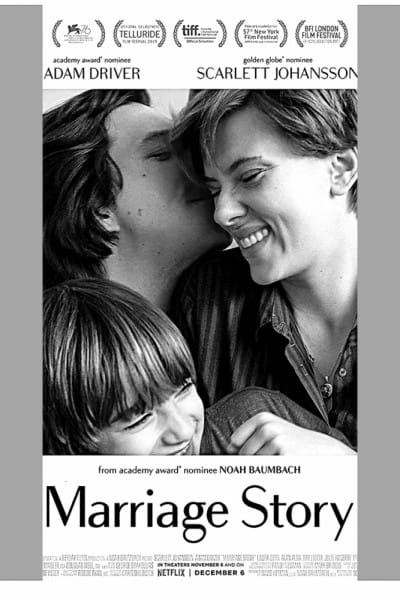Marriage Story: A Dead Marriage and Vulture Lawyers

The title of Noah Baumbach's 2019 movie Marriage Story is perhaps ironic and misleading. After all, the plot of this comedy-drama details the slow demise of a marriage that attracts a bunch of lawyers who senses profits from a potential divorce. It does not take one to be married to understand why the relationship of the seemingly compatible couple was falling apart. The story is all too familiar. Female authors have constantly used the plot of failed marriage that struggles to secure a room of one's own. Doris Lessing's "Room 19" and Kate Chopin's "The Story of an Hour" are notable examples.
Since the screenplay is done by the male director, one probably expects a vilification of the female characters. Any marriage story is incomplete without a good deal of love, lust, drama –definitely some drama – and tension. The marital clichés tilt the scale of guilt balance towards one member than the other. The movie is rather balanced as if its creator is trying too hard in not levying the involved parties with too many faults. The blame shifts mostly to different breeds of west coast lawyers: pricey, less-pricey, conniving or corporate, who benefit from the relationship wreck.
The movie begins with a list of good things that the couple writes for their marriage counselor. The lists offer snapshots of a couple who are compatible in every sense of term. They share their professional interest in Broadway theatre and love for their only son. The husband Charlie (played by Adam Driver) is the director while the wife is a talented stage actress Nicole (played by Scarlet Johansson). At the insistence of the counselor, the couple write what they love about one another, yet the wife decides not to share the positive things that she has written–an idea that gains further meaning towards the end of the movie.
The movie is set in both coasts of the US. New York and Los Angeles seem to be two characters in the movie as well. Charlie, Nicole and their son Henry are based in New York. Following their separation, Nicole and Henry move to L.A. where the theatre actress tries a new career in a T.V series. There are subtle hints of clash resulting from the presence of a high-brow Broadway performer in a popular Hollywood culture. Nicole is smart enough to solidify her role while Henry adjusts well to his life in California. Charlie meanwhile struggles to balance his work in New York and parental visits to LA. but he wasn't ready for was the divorce lawyers. Nicole quite casually hired a top lawyer (Nora Fanshaw played by Laura Dern), and to match her Charlie too ends up upping his game. The recruitment of Nora triggers a series of chaotic strings which none of the couple was ready for. Nora came with a recommendation from a colleague, and Nicole trying to fit in hires the sweet-shrewd lawyer. Nora ensures that battleground remains in LA where Charlie is eternally in a disadvantageous position to prove his worth as a father.
No wonder "space" itself poses to be a character. In Robbie Ryan's cinematography, Charlie is depicted in small interiors. Nicole moves out of her stage space and finds a larger space in a new medium. Even little Henry prefers staying in the toilet for long because that gives him a space outside the marriage battle. As audience we are privy to all these interior spaces of the main characters. It is hard to side with one character over the other, except perhaps the lawyer despite her sweet daggers. Because of the camera angles, Charlie seems to be portrayed sympathetically in some of the ironic situations. Charlie's loving relationship with in-laws slights the allegations that he is a cheating husband who made his wife feel "small." Nicole needed a space to grow and she hates her husband for not opting the opportunity to move to LA earlier. Henry's attachment to California and parallel drifting away from his father is another instance the audience may feel pity towards Charlie. The character of Henry is also very realistically portrayed. Like in many marriages, the child becomes a common denominator between two people.
The only criticism that I have is that there were moments in which the movie felt very slow and it seemed like the director was trying a bit too hard not to vilify his partner as he himself had come out of a well-publicized divorce. Perhaps he was cautious about camouflaging certain autobiographical details. Well, I don't know about Rotten Tomatoes but I would give the movie a thumbs-up.
Arshi Mortuza is an MA student of the Department of English at ULAB. She is an occasional contributor to the Star Literature and Reviews pages.

 For all latest news, follow The Daily Star's Google News channel.
For all latest news, follow The Daily Star's Google News channel. 



Comments